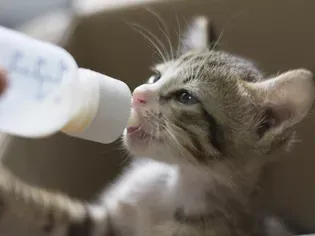Kitten Feeding Schedule: How Much Food Kittens Need
Updated on 05/26/24

Kitten Feeding Schedule: A Comprehensive Guide for Healthy Feline Nutrition
Introduction
Providing optimal nutrition for your precious kitten is crucial for their growth, development, and overall well-being. Establishing a proper feeding schedule is a fundamental aspect of kitten care, ensuring they receive the right amount of energy and nutrients at the appropriate intervals. This comprehensive guide will delve into the intricacies of kitten feeding schedules, including:
* How much food kittens need
* Frequency of feedings
* Type of food to feed
* Transitioning to adult food
* Monitoring kitten's weight and growth
By following these guidelines, you can help your kitten thrive and lay the foundation for a long and healthy life.
How Much Food Kittens Need
The amount of food a kitten needs depends on several factors, including:
* Age: Kittens have higher nutritional requirements than adult cats.
* Weight: Heavier kittens require more food than smaller kittens.
* Activity level: Active kittens burn more calories and need more food.
* Type of food: Different foods have different calorie densities.
As a general rule of thumb, kittens should consume approximately 25-35 calories per pound of body weight per day. For example, a 2-pound kitten would need about 50-70 calories of food per day.
Frequency of Feedings
Young kittens have small stomachs and cannot eat large meals. Therefore, it's recommended to feed them frequent, small meals throughout the day.
* 0-8 weeks: Feed kittens every 2-4 hours around the clock.
* 8-12 weeks: Gradually reduce feedings to 4-6 times per day.
* 12-16 weeks: Feed kittens 3-4 times per day.
* 4-6 months: Transition to 2 meals per day.
Type of Food to Feed
Choosing the right food for your kitten is essential. Look for high-quality kitten food that is:
* Formulated specifically for kittens: Kitten food is tailored to meet their nutritional needs.
* High in protein: Kittens require plenty of protein for growth and development.
* Contains essential vitamins and minerals: These are crucial for overall health.
* Avoids artificial ingredients and fillers: These can be harmful to kittens.
Transitioning to Adult Food
As kittens approach adulthood (around 6-8 months of age), their nutritional requirements change. Gradually transition them to adult cat food over a period of 7-10 days.
Monitoring Kitten's Weight and Growth
Regularly weigh your kitten to ensure they are growing at a healthy rate. Kittens should gain about 1 pound per week during the first few months of life. If your kitten is not gaining weight appropriately, consult with your veterinarian.
Additional Tips
* Feed your kitten in a quiet place where they feel comfortable.
* Make sure the food is fresh and at room temperature.
* Avoid overfeeding, as this can lead to obesity and other health problems.
* Provide access to plenty of fresh water at all times.
* Keep food and water bowls clean.
Conclusion
Adhering to a proper kitten feeding schedule is crucial for your pet's health and well-being. By understanding their nutritional needs, adjusting the frequency and amount of feedings as they grow, and choosing high-quality food, you can provide your kitten with the optimal foundation for a long and fulfilling life. Remember to monitor your kitten's weight and growth regularly, and consult with your veterinarian if you have any concerns.
Explore More Pets

Cat Behavior Problems
How to Stop Aggression in Kittens

Long-Haired Cat Breeds
Siberian Cat: Breed Profile, Characteristics, & Care

Cat Behavior Problems
How to Stop Kittens From Scratching and Biting

Long-Haired Cat Breeds
Turkish Angora: Cat Breed Profile, Characteristics & Care

Basic Training
How to Socialize Your Kitten

Short-Haired Cat Breeds
Cute Pictures & Facts About Calico Cats & Kittens

Litter Box Training
Training Your Kitten to Use the Litter Box

Long-Haired Cat Breeds
10 Fun Facts About White Cats
